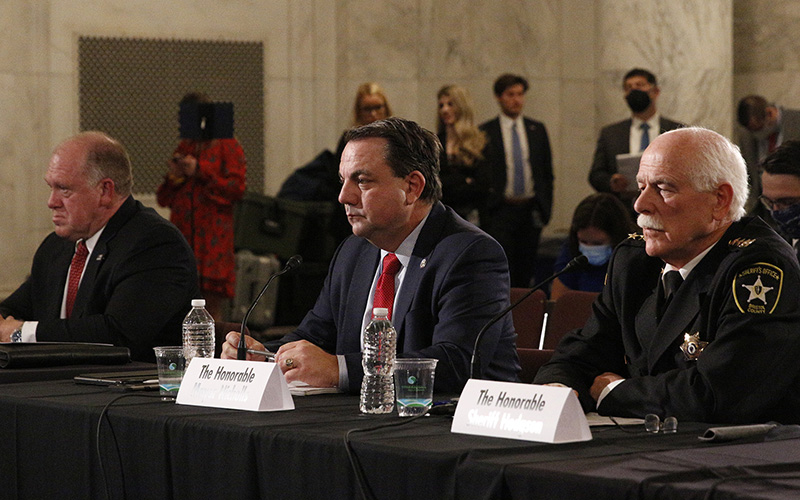WASHINGTON – Apprehensions at the southwestern border hit 1.7 million in fiscal 2021, the highest in more than 60 years, despite two months of declining numbers, according to the most recent data from Customs and Border Protection.
Apprehensions at the Arizona border were also up sharply, although neither the Yuma sector nor the Tucson sector of the border set records in 2021.
CBP reported 114,485 “encounters” with migrants in the Yuma sector in the last fiscal year, more than 13 times the total from fiscal 2020, but still well below the peak of 138,438 in 2005.
In the Tucson sector, encounters almost tripled, to 191,232, but that was far below the record year of 2000, when 616,346 apprehensions were recorded. Border Patrol agents stopped more migrants in the Tucson sector every year from 1995 to 2010.
Critics have been quick to lay the blame for the surging numbers at the feet of President Joe Biden, who reversed many of former President Donald Trump’s harsh border policies.
But while the overall numbers can be shocking at first glance, some experts said they can also be misleading, since one migrant may try to cross the border several times, but will show up repeatedly in the total, inflating the apparent number of migrants.
“We know that the actual number of individuals who were caught crossing the border is much lower than 1.7 million, we can estimate that it was about 1.1 million,” said Jessica Bolter, associate policy analyst at the Migration Policy Institute.
Aaron Reichlin Melnick said the higher numbers of migrants apprehended also reflects the greater enforcement along the border. From the 1980s to the 2000s, he said, migrants could more easily enter the U.S. because there were not as many Border Patrol agents to stop them.
But Matthew Tragesser, spokesperson for the Federation for American Immigration Reform, said the numbers speak for themselves. And what they are saying, he said, is that the Biden administration’s immigration policies are not working.
He pointed to the Biden administration’s decision to almost immediately reverse many of the policies that were hallmarks of Trump’s administration. Biden halted construction of the border wall, moved to reinforce the Deferred Action for Childhood Arrivals program and end the Migrant Protection Protocols, the so-called “remain in Mexico” program that forces asylum seekers to stay in Mexico while waiting for an asylum hearing.
Courts have since ordered the Biden administration to reinstate the Migrant Protection Protocols, something the White House has said it hopes to have in place by mid-November, after negotiating with the Mexican government. But Tragesser said the reversal of Trump policies have encouraged migrants to come to the U.S.
“We’ve never seen apprehensions like this in our nation’s history. Border patrols are strained and overwhelmed and they really can’t do their job effectively,” Tragesser said.
The increase in border apprehensions began during the last year of the Trump administration and continued steadily until July. They declined in August and September, months when apprehensions typically rise as temperatures fall and make a crossing less dangerous.
But the increasing numbers have burdened the Biden White House administration since early in the administration, despite a proposed strategy of increasing aid to the Northern Triangle countries – El Salvador, Honduras and Guatemala – in hopes of stemming migration at its source.
Vice President Kamala Harris visited Guatemala in June and told migrants who were thinking about making the trek to the U.S., “Do not come. The United States will continue to enforce our laws and borders.”
The latest numbers from CBP show that the largest share of migrants, 608,037, continued to come from Mexico. But Honduras, Guatemala and El Salvador together accounted for 683,894 of the migrants stopped in fiscal 2021.
“I just want to reiterate here, it’s an unsustainable system, it’s madness and mayhem,” Tragesser said. “We’ve never seen apprehension hurdles like this in our nation’s history. Border Patrol are estranged, overwhelmed and they really can’t do their job effectively.”
He blamed administration officials for not spending enough time at the border, “talking to ranchers, talking to residents, CBP officials.
But Melnick said there is only so much that can be done to dissuade migrants as long as the U.S. “the beacon of freedom that Ronald Regan once talked about.” He said people in foreign countries still hold dreams of living in the U.S. and having better opportunities.
Instead of working to keep people away, Melnick believes the United States should instead be working on fixing a system that will treat migrants as humans.
“I think we should be working on building out our humanitarian protection system and ensuring that all people can access protection through a safe, orderly and humanly system,” he said.


